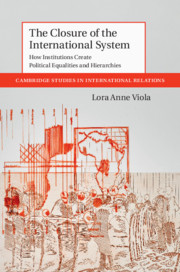 The Closure of the International System
The Closure of the International System The Interdependent Logics of Equality and Inequality in the International System
Published online by Cambridge University Press: 16 June 2020
The international relations (IR) literature appears to be divided into two fundamentally different views about the basic structure of the international system and its institutions. On one view, the expansion and opening of international institutions in the 20th Century to include more actors and greater geographical reach, combined with strengthening democracy norms, are driving the democratization of international institutions. At the same time, a more critical literature is emerging that instead views the system as permeated by multiple forms of hierarchy and deep structures of domination. This chapter, in contrast, argues that political equality and inequality obstinately co-exist in international institutions because of their very role in regulating access to collective goods. It develops what I call the closure thesis to explain how institutional designs reflect an ongoing struggle between the assertion of equal rights and the preservation of unequal privileges. This argument requires re-thinking three premises: that equality and inequality are antagonistic; that greater inclusiveness typically promotes a move towards greater equality; and that international institutions provide global public goods. This chapter elaborates on these points, situates them in the literature, introduces the closure thesis, and outlines the rest of the book.
To save this book to your Kindle, first ensure no-reply@cambridge.org is added to your Approved Personal Document E-mail List under your Personal Document Settings on the Manage Your Content and Devices page of your Amazon account. Then enter the ‘name’ part of your Kindle email address below. Find out more about saving to your Kindle.
Note you can select to save to either the @free.kindle.com or @kindle.com variations. ‘@free.kindle.com’ emails are free but can only be saved to your device when it is connected to wi-fi. ‘@kindle.com’ emails can be delivered even when you are not connected to wi-fi, but note that service fees apply.
Find out more about the Kindle Personal Document Service.
To save content items to your account, please confirm that you agree to abide by our usage policies. If this is the first time you use this feature, you will be asked to authorise Cambridge Core to connect with your account. Find out more about saving content to Dropbox.
To save content items to your account, please confirm that you agree to abide by our usage policies. If this is the first time you use this feature, you will be asked to authorise Cambridge Core to connect with your account. Find out more about saving content to Google Drive.